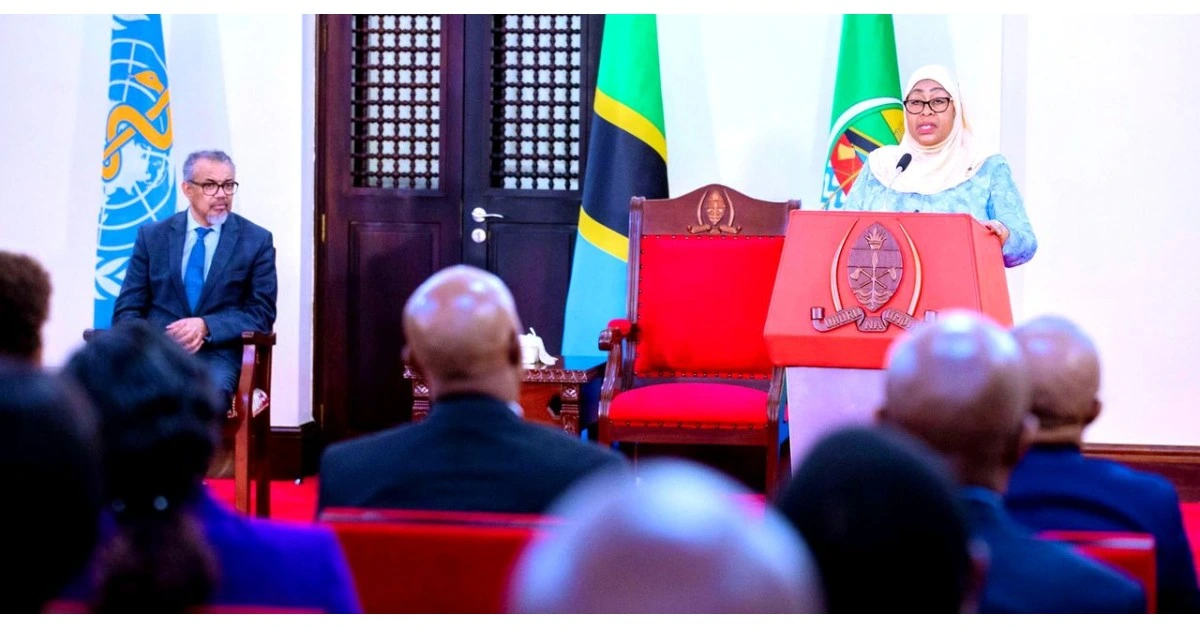
TANZANIA –Tanzania’s President Samia Suluhu Hassan has confirmed an outbreak of the Marburg virus, an Ebola-like disease, in the country’s Kagera region.
This announcement, made during a press briefing with World Health Organization (WHO) Director-General Dr. Tedros Adhanom Ghebreyesus, comes just a week after the health minister denied any cases of the virus.
President Hassan revealed that laboratory tests conducted at the Kabaile Mobile Laboratory in Kagera, later confirmed in Dar es Salaam, identified one positive case.
“Fortunately, the remaining suspected patients tested negative,” she said, noting that all 25 individuals under observation had tested negative and were being closely monitored. The cases were reported in the Biharamulo district of Kagera.
Reassuring the public and the international community, President Hassan emphasized the government’s preparedness to address the outbreak.
“We have demonstrated in the past our ability to contain a similar outbreak and are determined to do the same this time around,” she stated.
She further reiterated Tanzania’s commitment to tackling global health challenges, including the Marburg virus disease.
The outbreak follows a WHO report from January 14, which highlighted nine suspected cases and eight deaths over five days in Kagera.
However, Health Minister Jenista Mhagama had previously disputed these findings, stating that all initial suspected cases had tested negative.
During the joint press briefing, President Hassan announced that a rapid response team had been deployed to follow up on suspected cases and strengthen containment efforts.
Marburg, a highly infectious disease, causes symptoms such as fever, muscle pain, vomiting, diarrhea, and, in severe cases, death from extreme blood loss. According to the WHO, the virus has an average fatality rate of 50%.
Dr. Tedros Adhanom Ghebreyesus noted that the global risk posed by Tanzania’s outbreak is “low” and praised the government’s swift action. “Even though there is no approved treatment or vaccines, outbreaks can be stopped quickly,” he said.
Tanzania has experience in managing Marburg outbreaks, with its first case reported in March 2023 in the Bukoba district.
That outbreak lasted nearly two months, resulting in six deaths. Building on this experience, the government has enhanced its response by establishing treatment centers, deploying national response teams, and setting up mobile laboratories for testing samples.
The WHO has committed US $3 million from its Contingency Fund for Emergencies to support Tanzania’s efforts.
“Since the first suspected cases of Marburg were reported earlier, Tanzania has scaled up its response by enhancing case detection, setting up treatment centers and a mobile laboratory for testing samples, and deploying national response teams,” Tedros said during the media briefing.
“Tanzania has gained strong experience in controlling Marburg as this is the second reported outbreak of the disease in Kagera. The first outbreak was almost two years ago, in March 2023, in which a total of nine cases and six deaths were reported,” he added.
Similarly, the Africa Centres for Disease Control and Prevention (Africa CDC) has pledged $2 million to bolster immediate response measures.
Africa CDC Director General Dr. Jean Kaseya announced the deployment of a 12-member multidisciplinary team, including epidemiologists, infection prevention experts, and laboratory specialists, to support surveillance, diagnostics, and community engagement.
“Building on Tanzania’s commendable response during the 2023 outbreak, we are confident that swift and decisive action, combined with our support and that of other partners, will bring this outbreak under control,” Dr. Kaseya added.
Marburg virus, transmitted to humans from fruit bats, spreads through contact with bodily fluids of infected individuals or contaminated materials.
While no licensed treatment or vaccine currently exists, clinical trials for potential countermeasures are ongoing.
Early treatment, including rehydration and symptom management, significantly improves survival.
The outbreak in Tanzania highlights the ongoing threat of Marburg in Africa. Previous cases have been reported in countries like Angola, Ghana, Uganda, and Kenya.
Notably, neighboring Rwanda declared an end to its own outbreak in December, which had infected 66 people and claimed 15 lives.
XRP HEALTHCARE L.L.C | License Number: 2312867.01 | Dubai | © Copyright 2025 | All Rights Reserved